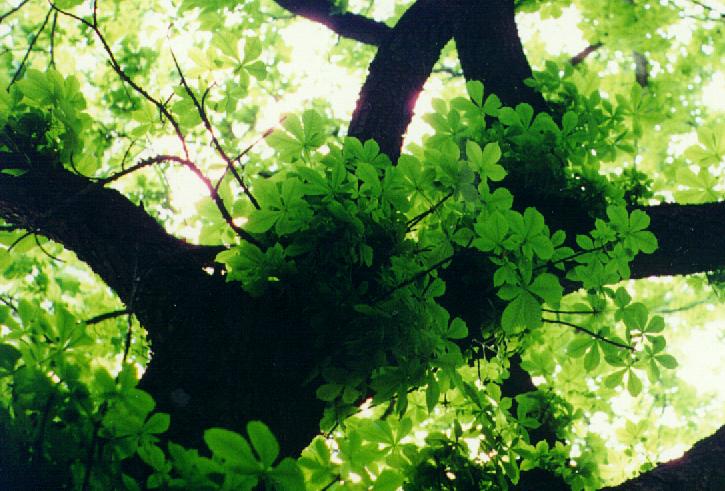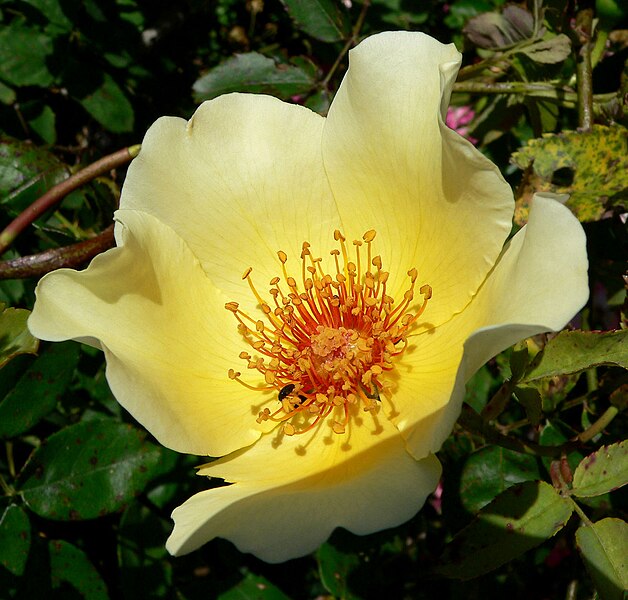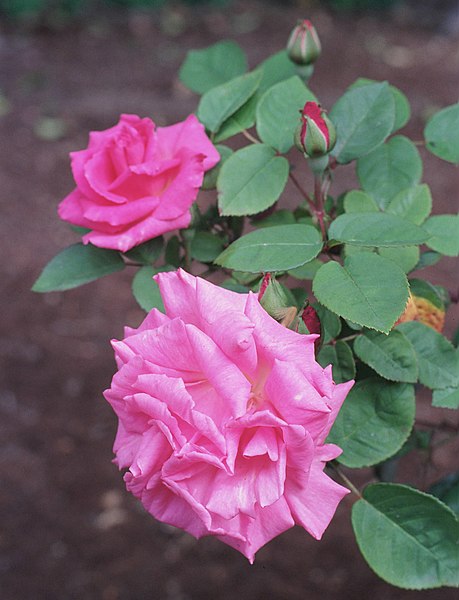.
Leaves and trunk of Aesculus hippocastanum (common horse-chestnut), Estrela Garden, Lisbon: photo by Alvesgaspar, 2007
Twenty-some years ago, I read Graham Stuart Thomas's
"Colour in the Winter Garden." I didn't plant
a winter garden, but the book led on to his
rose books: "The Old Shrub Roses," "Shrub Roses
of Today," and the one about climbers and ramblers.
By the corner of the arbor I planted the splendid
Nevada (a Spanish rose, Pedro Dot) and on the arbor
yellow Lawrence Johnston -- I've never known
anyone who made a real success of that. Then
a small flowered rose (like a blackberry in flower),
whose name I forget, and then, oh loveliness, oh
glory, Mme. Alfred Carrière, white, with a faintest
blush of pink, and which will bloom even on a
north wall. I used to shave and gaze down into her --
morning kisses. The day Robert Kennedy died, a
green and evil worm crawled out of a bud. I killed
it, a gardening Sirhan Sirhan.
At the corner of the house Rosa Mutabilis fluttered
its single, changeable wings. My favorite, perhaps.
Rosa "Golden Wings", San Jose Heritage Garden: photo by Stan Shebs, 2005
Then, in the border, along the south side of
the white house, Golden Wings (a patented rose --
did you know you can patent roses? Well, you can);
prickly, purplish Rose de Rescht; Souvenir
de la Malmaison (named by a Russian Grand Duke in
honor of the Empress Joséphine, Empress of Rosarians);
Mabel Morrison, lifting her blowsy white blooms
to the living-room windows.
Then Georg Arends, whose silver-pink petals
uniquely fold into sharp points (or is Georg
my favorite?).
And darkly brooding Prince Camille de Rohan, on
which, out of a cloudless sky, a miraculous rain
once fell. (But I'm forgetting Gloire de Dijon,
Dean Hole's favorite rose.)
Then the smallest, most delicate, delectable
of all, Rose de Meaux. Alas, it pined away.
Rosa "Zephirine Drouhin", gr. Borbonianas, sect. Chinensis, Real Jardin Botánico, Madrid: photo by A. Barra, 1988
And elsewhere more: Rosa Gallica, the striped
and the pink, the Pembertons, Persian yellow,
and unforgettable cerise Zéphirine Drouhin.
And a gray rose, Reine des Violettes. Sweet-
brier, Mme. Piere Oger, Variegata di Bologna,
"like raspberries and cream." And more,
whose names escape me.
I went by there Sunday last and they're gone, all
gone, uprooted, supplanted by a hateful "foundation
planting" of dinky conifers, some pointed, some
squatty roundish. I put a curse on it and them.
Aesculus hippocastanum (common horse-chestnut), flowers: photo by Bogdan Gíusca, 2005
On either side of the front walk there towered two
old horse-chestnut trees. I loved their sticky,
unfurling leaves, and when they bore their candles
it was magic, breath-catching, eye-delighting. Cut
down, cut down. What kind of man cuts down trees
that took all those years to grow? I do not
understand.
Oh, well, it's his house now, and I remove the
curse, but not without a hope that Rose de Rescht
and the rugosas gave him a good scratching. He
deserved it.
But oh dear: I forgot the five Old China Monthly
roses, and I always wish I'd planted Félicité
et Perpétue -- it's their names I like. And
Climbing Lady Hillingdon.
(But the Garland grown as a fountain seemed
somehow beyond me.)

Rosa "Félicité et Perpétue", gr. Sempervirens, sect. Synstaelae, Real Jardin Botánico, Madrid: photo by A. Barra, 1988
There are roses and roses, always more roses.
It's the horse-chestnut trees I mind.
It's the horse-chestnut trees I mind.

Aesculus hippocastanum (common horse-chestnut), Kiev: photo by K. Eno, 2006
James Schuyler: from Last Poems in Collected Poems, 1993
("I have a special thing about roses" -- Letters)






This post is dedicated to Zephirine, who so wonderfully designed this blog in the first place; and to Angelica, who so heroically typed up Jimmy's love letter to roses and horse-chestnut trees; and to Simon, who so kindly reminded us of this poem last week.
ReplyDeleteOh, I love this, not only is it a wonderful poem but it happened to me! Not the horse-chestnuts, but my lovingly assembled garden of old roses was ripped up by the next owners of the house. I also hoped that they'd been thoroughly scratched, especially by the Maiden's Blush (which has vicious thorns, make of that what you will).
ReplyDeleteI did grow Lady Hillingdon, and Félicité et Perpétue, and Zéphirine Drouhin who gave me my internet moniker, and the even more stunningly named Ghislaine de Féligonde. And very wonderful they all were. Nevertheless, the loss of a horse chestnut would be far more serious.
Thank you so much for posting this, Tom.
Lovely -- a great way to start the day and week with horse-chestnut trees and roses and the ever-delightful Schuyler.
ReplyDeleteAt my college reunion this weekend, on a campus which is an officially designated arboretum, I visited, as I always do, the rose garden, which seemed somehow diminished in stature and loveliness this year. This poem and garden tour make up for that loss.
ReplyDeleteZeph,
ReplyDeleteWe do love the idea of a small demure volunteer army of Maiden's Blush and Rose de Rescht attacking the insouciant arrivistes.
Marcia,
You have helped to work me up into a light lather of Schuyler enthusiasm this week.
Curtis,
What the diminished gardens of your alma mater cannot provide, you will always be able to find here. Maybe. We hope.
Hey Tom, thanks for this post - beautiful!
ReplyDeleteSince Simon says it, I think it must be true.
ReplyDeleteTwo more comments I've found on my week's time with Schuyler and then I promise to get off this kick. Schuyler stated (this from the introduction to The Diary of James Schuyler) "I like an art where disparate elements form an entity." Just perfect.
ReplyDeleteAnd from The Morning of the Poem, very near the end, these lines struck me: "Before/dawn I woke and made my oatmeal, orange juice and/Coffee and thought how this poem seems mostly about what I've lost:/the one who mattered most, my best friend, Paul/(Who mattered least), the Island, the California wild-flower paper,/the this, the that, Whippoorwill, buried friends,/ And the things I only write between the lines. What can one write/between the lines? Not one damn thing. Look over/Your shoulder, into the future: one thing I want to see is heavy/snow falling in Chelsea, to walk in it, snow/Blowing in my face, from where I live to where you live, to stomp/the snow off in your vestibule, to punch your bell,/ To hear the buzzer buzz, to push the door and see the open inside/ door and you smiling there..."
One interesting addendum here. This Schuyler poem first appeared in the New Yorker. And when it did, as Simon (who by the way has been a faithful editor to Jimmy on more than one occasion), pointed out to us last week, there was a bit more to it.
ReplyDeleteAs Simon further remarks today,
"...absent in error, I think in the printing in the book
but very much part of it (in its original New Yorker publication),
a single embittered additional comment,
set off, as an extra line at the end:
'Odious hateful vandal'"
That, as they used to say, puts a fine point on it.
Tom,
ReplyDeleteThanks for these beautiful roses (poem plus photos), to Jimmy's list of loved ones I would add the Belle of Portugal (which climbs the cypress trunk in the yard AND has bloomed twice this year, January and May), and the Cecile Brunners (beginning to fade now but they will go on for months) and the Graham Thomas (whose yellows by the front door and the fence across the way are now beginning to burst) and that unknown old Bolinas giant at the back corner of the house (under which the displaced quail have found a new home, its green now covered with pink-red. . . .
6.7
grey whiteness of clouds above shadowed
ridge, red-tailed hawk calling in right
foreground, no sound of wave in channel
these phenomena inaccessible,
that system of thought
as consequence, painting its
own aim, time of other
silver of sunlight reflected in channel,
line of pelicans gliding toward horizon
"And the things I only write between the lines. What can one write/between the lines? Not one damn thing."
ReplyDeleteOr a whole life.
Thanks Marcia (I like this kick).
Steve,
ReplyDeleteThank you for the gliding pelicans.
The pelicans, revenant. We wish.
I am swimming in rose trivia as well as exhaustion after a night of immersion in virtually fragrant petals.
And ah, the colours of these gardens (of the mind)...
Those big rich yellow Graham Thomas... one of several varieties that did not make the cut. Bumped out here by Jimmy's apparent preference for the beautiful delicate Nevada.
It seems every great lady (and perhaps a few not so great ladies and even a few men) listed in Brett's also has a rose named after it/her/them.
There is even a Rosa "Jane Asher", so it seems being a minor film star will even qualify you for a rose-naming. Maybe.
(The language imagination still dallying over Zeph's "even more stunningly named Ghislaine de Féligonde...")
Jimmy writes somewhere -- losing my mind, can't remember where -- that it was important to him to learn the names of all the roses; and then to forget the names, and remember just the (as per today's poem by you, mutating a bit) "accessible phenomena".
And there's the late poem "Princess Di":
"...you smiled and/ you left a soft pink rose/ on my bed and I went/ back of beyond to/ the place so far away/ where time is eternal and/ infinity is grasped not/ understood: and when I/ came round there was the rose/ in a clear plastic container/ aslant the petals not yet/ curling back and I knew that/ the rose was extra special/ and you came and I asked/ 'Who gave me that rose?' You/ laughed and you said, 'Why/ I did: its name is/ Princess Di..."
And too, Herrick: "Gather ye rosebuds while ye may..."(indirectly? derived from De rosis nascentibus, late Latin poem by Ausonius, 4th c. AD, describing roses blooming @ Paestum, and urging that they be gathered before the lustre is lost... quoted by Burton 1621, though surely Herrick also knew the original).
Schuyler & Herrick,
& the curtain rose
upon the day sun...
...The higher he's a getting;
The sooner will his Race be run,
And nearer he's to Setting.
Nowadays being a minor film star seems to be the rule, that or a Worthy Cause - we have lots of new roses named as tie-ins with charities. Of course there are big film star roses too, Ingrid Bergman is particularly fine. But in the 19th century I think they were mostly named after wealthy patrons of the rose breeder.
ReplyDeleteI thought Ghislaine was a WWI heroine but it seems not: it's a myth. Sigh.
re: 'gather ye rosebuds' and similar, Ronsard does it pretty well:
ReplyDeleteVivez, si m’en croyez, n’attendez à demain :
Cueillez dès aujourd’hui les roses de la vie.
the last line of which I shall one day, when I'm rich, have engraved on a sundial in my rose garden.
Zeph, wonderful sundial inscription. And high time for it! Thanks too for reminding us of Handel's Lascia la spina from Il Trionfo del Tempo. (This is not the Hallenberg but the Bartoli, which comes with a rich rose gallery.)
ReplyDeleteAnd too bad about Ghislaine, another rose-coloured dream dashed alas...